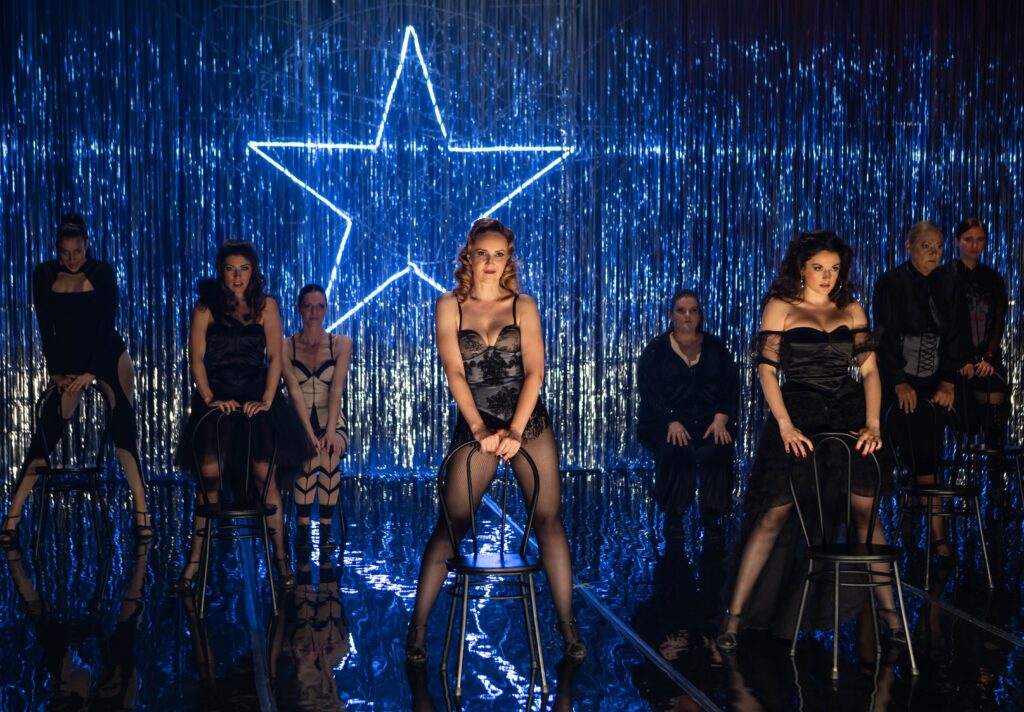National Theater Subotica, premiere 25th May 2023
Ivan Leo Lemo’s authorial project is many things: it’s a three-hour-long alternative, feminist, matriarchal history of Yugoslavia; an exploration of what would have happened if a female marshal had come to lead Yugoslavia after Tito; a series of alternating monologues by eight women, each personifying one of the six republics and two provinces of Yugoslavia.
The framing device of the cabaret takes the form of an episode of Oprah Winfrey’s talk show. Her guest is Danica Drmalov, a pilot from the vicinity of Mostar, who recounts her personal and political history – her birth into a patriarchal family, her life with six sisters, and a violent father who longed for a son. It continues through the founding of FACK (Feminist Action Committee), the organization of a coup, and her eventually becoming a state leader.
Marshal Danica is ardently committed to radical feminism, armed with literary knowledge, personal trauma, and a rebellious character. Death to machismo and freedom to women is Danica’s motto. She criticizes the former party and regime and the brotherhood and unity for forgetting about sisters and sisterhood.
Lemo, takes a part of Tito’s slogan, ‘preserve brotherhood and unity like the pupil of your eye,’ coined to maintain peace and ease tensions among different nations living in the same country, and removes the national context from it. It also ignores the fact that women in Yugoslavia were granted the same legal rights as males. Therefore, it appears incorrect to associate feminist language with socialist and anti-fascist sentiments. It was not Yugoslavia’s political-economic system that oppressed women but rather the patriarchal structure.
The performers tell their stories in front of a shimmering curtain. Teuta, an archaeologist educated in Belgrade, narrates from the Bay of Kotor. Her emancipation begins with a science-fictional journey into the depths of the sea, where she meets the Illyrian queen Teuta, who imparts her treasure. Svetlana Vrsalović, a Serbian from Kragujevac, is raised by her father, a smuggler from the Zastava factory as if she were a son. He shows her love by teaching her to shoot with guns. Her feminist self does not exist. From early childhood, she adopts male behavioural patterns, and later in the matriarchy, she becomes similar to men in the patriarchy. Esma Omerpašić, a worker in a cosmetic salon in Zagreb, romanticizes her love affair with a violent gambler Armando. Even after women take control of the authorities and ‘hunt’ Armando as a criminal, she defends him and directs her anger towards women, aligning with the pattern ‘women are women’s worst enemies’ associated with women who internalise and uphold patriarchy.
The most interesting story comes from Ljupka, a Macedonian sex worker who delves deeper into criminal activities and starts running brothels. There was a missed opportunity for the authors to address the position of sex workers, given that this issue sparks debates within feminism. Slovenia is represented by a geneticist and representative of transhumanism devoid of any idea of humanism, focusing on the concept of the cyborg immortal human. The actress Suzana Vuković, representing Vojvodina, expresses extremely anti-feminist views in her monologues.
From Kosovo, or rather, the sky above Kosovo, a star appears – the unborn Dua Lipa, who ultimately never gets born because women have taken on the social functions and roles of men, and there were no wars in the 90’s when, in real life, her parents emigrated to London. It’s unclear, however, why it should be important to the audience whether Dua Lipa was born as her monologue does not create anticipation, hope, or excitement about the future singer’s birth.

Kabare Jugoslovenske
The only common thread in all these stories is the moment when all these women (except Dua Lipa) joined FACK. The monologue format often struggles to hold the audience’s attention, even though the content was lively and occasionally witty. Most of the monologues feel like blunt instruments, aiming at the patriarchy and missing the mark. The performance requires tighter pacing and a more focused flow of ideas. From a directorial perspective, however, the cabaret format is highly seductive on stage, although there is room for further exploration, especially in the last third of the performance.
The songs (Zvonimir Dusper Dus) and choreography (Alen Sesartić) are the most exciting part of the performance, especially when well-known Yugoslavian songs are sung with modified lyrics criticizing the patriarchy. The actresses successfully convey the cabaret’s ecstasy and euphoria. Jelena Mihajlović and Sanja Moravčić, who speak in a pseudo-Macedonian and Slovenian language, are particularly outstanding. The young actresses Nikolina Vujević and Sofija Mijatović demonstrate incredible energy and ease in their performances.
(It’s important to note that this is one of the very few productions on the Serbian theatre scene that engages the entire female ensemble of an institutional theatre – with Minja Peković also present via audio.)
The humour relies on wordplay and more or less skilful playing with stereotypes. For example, after the revolution, women established an organization called GUZA (guza – butt), an acronym for a gay organization that knows all the gossip and everything about everyone, which is the counterpart to the State Security Administration (UDBA). In the post-revolution era, women have found allies in the gay population, in accordance with the old stereotype. We are told gay men join the military because ‘they will do all the push-ups if you promise them shopping’ – which is borderline offensive.
The women’s revolution, as expected, like any revolution, has devoured its children. It turns out that if women had taken over power after Tito, the present situation would have been just as bad as when men ruled the state(s). Beneath the sequins of the costumes and neon lights, lies a universal nihilism. It makes no difference whether it’s a matriarchy or patriarchy, whether the state is governed by men or women, there is no salvation for the former Yugoslavian states.
The key problem with the performance is the absence of a clear thesis or standpoint. Everything said on stage illustrates that the patriarchy is bad and that women suffer in various ways within the patriarchy, whether being mistreated by men or a system designed to serve men (which is true). However, the plot could have been set in any (former) state and at any time. There are no clear positions on matters of nation and leftist ideologies, which are crucial ideas associated with Yugoslavia, and the concepts are often mixed (as in the example given that sisterhood was excluded from brotherhood and unity due to Yugoslavia’s anti-feminist orientation or the blending of radical and liberal feminism).
The dissection of Yugoslav society and its legacy opens up such broad horizons in terms of topics: ideology, workers’ rights, the victories of Yugoslav women achieved for women’s rights, issues of the nation… Unfortunately, none of this was utilized. All we were told, over and over again, albeit with phenomenal music, great performances, and at least semi-funny jokes, is that the patriarchy is bad.
Credits:
Director and text author: Ivan Leo Lemo // Composers: Zvonimir Dusper Dus // Choreography: Alen Sesartić // Costume Designer: Marko Marosiuk
Cast: Suzana Vuković, Jelena Mihajlović, Sanja Moravčić, Kristina Jakovljević, Monja Medaković Vuksanović, Nikolina Vujević, Vesna Kljajić Ristović, Sofija Mijatović, Minja Peković // Songs sung by Nikolina Vujević // Stage set: Vesna Režić // Sound design: Ištvan Nemet // Light design: Nedo Ilić
For further information, visit: suteater.org
Divna Stojanov is a dramaturg and playwright. She writes mainly for children and young people.








